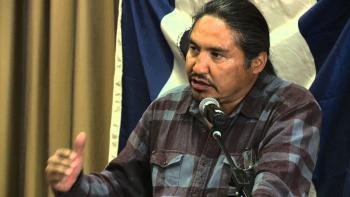Image Caption
Summary
Local Journalism Initiative Reporter
Windspeaker.com
Updated at 2:03 p.m. Feb. 3, 2022: (Alberta)
As truckers restrict traffic at the Canada/U.S. border at Coutts, Alta. (now into its sixth day), the Athabasca Chipewyan First Nation is calling racism.
“If it was a First Nation standoff or blockade, I guarantee you the RCMP would have been in there in the first hour,” said ACFN Chief Allan Adam.
The blockade stopped traffic at the Alberta/Montana border starting Saturday. One lane each way was opened on Wednesday, although truckers remained on the road.
Thursday, a second truckers’ blockade went up near Milk River also restricting traffic at the Coutts border.
Truckers were initially protesting the federal vaccine mandate for truck drivers to cross the border back into Canada. The U.S. has a similar mandate to cross over into that nation. Now, the protest has grown to include provincial restrictions and mandates around controlling the spread of the coronavirus.
The lack of enforcement of Alberta’s Critical Infrastructure Defence Act is the only proof Adam says he needs that the act is racist.
“Here we got the truckers protesting on critical infrastructure, trucks in Alberta going into Montana. There’s a supply line there of trucks and oil and everything, and that’s a critical major infrastructure. Why was there no intervention by the law enforcement in that regard?” said Adam.
The Critical Infrastructure Defence Act (or Bill 1) came into force on June 17, 2020. It was introduced by the UCP government a few months earlier in response to blockades over a pipeline dispute in northern British Columbia that had shut down Canada’s rail network. That dispute was being led by Indigenous people and environmentalists.
“Bill 1 is geared only towards First Nations when it comes to major development on traditional territories of First Nations people when they advocate for a clean environment or clean drinking water or for economic development. When things don’t go their way, there’s a dispute and when a dispute comes up, tensions grow between two organizations. And that’s why they put this Bill 1 up, to alleviate First Nations from protesting on traditional lands,” said Adam.
The Critical Infrastructure Defence Act protects essential infrastructure from trespassers, damage or interference of any kind. Anyone found guilty of an offence under that act is subject to a fine between $1,000 to $10,000, jail time of up to six months, or both. A second offence at the same location carries a maximum fine of $25,000 and a possible six-month jail term. If the offender is a corporation, they can be fined between $10,000 and $200,000. The fine is implemented each day of the offence.
On Feb. 2, the ACFN tweeted a statement condemning the lack of enforcement of the Critical Infrastructure Defence Act.
Adam says they have received favourable response from other First Nations, including Treaty 8, and “they’re all thankful of the fact we sent out the letter in that regard.”
In a commentary published Feb. 2 at lawnow.org, author Jessica Steingard, a staff lawyer at the Centre for Public Legal Education Alberta, states, “We are seeing blockades of the highway in Coutts, Alberta, near a major Canada-USA border crossing… Police have said safety is their first concern, and they do not want violence to erupt. We do not know whether any arrests or charges have been laid under this Act since it first came into force. So, the question is how and when will this law be enforced?”
The ACFN’s statement says, “It is important to recognize the disparity between how Indigenous and non-Indigenous protests are approached by our government. It is shocking to see this blatant disparity as we watch the complete government inaction to address the blockade at Coutts.”
Fraser Logan, spokesperson for Alberta RCMP, said he is aware of the ACFN’s statement.
“It’s nothing we would compare as Indigenous and non-Indigenous. We look at it as simply what is occurring right now,” said Logan. “Our disposition is always different. It would be a disservice to make any comparison until this incident has been concluded.”
Logan did not know why charges had not been laid under the Critical Infrastructure Defence Act.
“Everything is a slow escalation. It’s a slow movement from peaceful, try to negotiate, to moving up to the next step. You never start at 10 if you’re on a scale of one to 10. So I can’t speak for the operational decisions that are being made … All of those acts from traffic safety all the way up to (the Critical Infrastructure Defence Act), those are all in consideration,” said Logan.
A Feb. 3 joint statement from the Alberta Association of Chiefs of Police, says, “As these events have unfolded, all of Alberta’s police services and Alberta Sheriffs, throughout the province, have worked together to ensure public safety has been balanced with the right to protest legally and peacefully.”
As far as Adam is concerned, the fact that the Critical Infrastructure Defence Act has not been implemented “actually, it’s a blessing. Now we’re calling on the premier, Jason Kenney, and his caucus to do away with Bill 1 because they’ve been caught red-handed that this is a racist bill.”
In an email statement to Windspeaker.com, Adrienne South, spokesperson for Alberta Indigenous Relations, said, “Alberta’s government is committed to true and meaningful reconciliation. We recognize there is frustration regarding the recent blockades. Indigenous Relations and government as a whole is continually working against racism to ensure people are treated fairly and improving outcomes for Indigenous Peoples, communities and organizations.”
South noted operational enforcement decisions for the blockade were the responsibility of police services while enforcement at the border crossing was a federal responsibility.
“The government does not and never has directed police actions or enforcement,” said South.
Local Journalism Initiative Reporters are supported by a financial contribution made by the Government of Canada.

